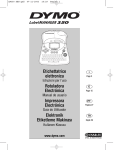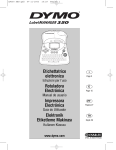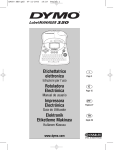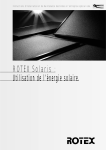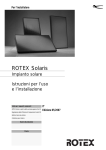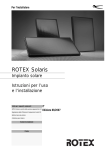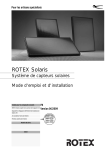Download AVK 2472 Instruction manual
Transcript
AMERICAN AVK COMPANY AVK SERIES 2472 - HIGH PRESSURE, WET BARREL HYDRANT FIELD MAINTENANCE AND INSTRUCTION MANUAL TABLE OF CONTENTS EXPLODED ASSEMBLY / PARTS LIST INTRODUCTION / DESCRIPTION RECEIVING AND STORAGE INSTALLATION AND TESTING - INSTALLATION - TESTING OPERATION AND MAINTENANCE - HYDRANT TOOLS - OPERATION - MAINTENANCE PROCEDURES - INSPECTION - DISASSEMBLY FOR INSPECTION - REASSEMBLY AFTER INSPECTION REPAIR PROCEDURES - TRAFFIC REPAIR KIT OPTIONAL EQUIPMENT - FLOWGUARD TROUBLESHOOTING GUIDE PARTS AND SERVICE WARRANTY American AVK Company An ISO 9001-2000 registered company Maintenance Manual Series 2472 *Subject to change without notice. (rev. 02/09 A) 101 109 110 111 112 113 141 139 140 137 131 132 28 120 114 139 138 American AVK Series 2472 High Pressure Wet Barrel Hydrant Exploded Parts Breakdown 134 142 135 136 133 114 128 129 19 115 114 122 31 page 1 Item No. 19 22 23 24* 25 28 31 101 109 110 111 112 113 114 115 116 120 122 126 128 129 131 132 133 134 135 136 137 138 139 140 141 142 Description Hose Nozzle Cap Hose Nozzle O-ring Nozzle Retaining Screw Chain Set Pumper Nozzle O-ring Pumper Cap Nozzle Section Washer Nozzle Section Outer Stem Nut O-ring Stem Nut Inner Stem Nut O-ring Dummy Nut Dummy Nut Retaining Bolt Nozzle/Stem/Thrust Nut Retaining Screw Hose Nozzle Cap Gasket Hose Nozzle Pumper Cap Gasket Nozzle Section Bolt Pumper Nozzle Threaded Hose Nozzle O-ring Threaded Hose Nozzle Threaded Pumper Nozzle O-ring Threaded Pumper Nozzle 2.5" Valve Disc 2.5" Valve Stem 2.5" Thrust Nut 2.5" Thrust Collar 4.5" Valve Disc 4.5" Valve Stem 4.5" Thrust Nut 4.5" Thrust Collar 4.5" Thrust Nut O-ring 2.5" Thrust Nut O-ring * Not Shown page 2 Material Grey iron, ASTM A126, "B" NBR 304 Stainless steel Zinc Plated steel NBR Grey iron, ASTM A126, "B" Zinc Plate, 304,316 Stainless steel Ductile Iron, ASTM A536 NBR Copper Alloy NBR Grey iron, ASTM A126, "B" 304 Stainless steel 304 Stainless steel NBR, Neoprene Copper Alloy NBR, Neoprene Zinc Plate, 304,316 Stainless steel Copper Alloy NBR Copper Alloy NBR Copper Alloy EPDM encapsulated ductile iron Copper Alloy Copper Alloy 304 Stainless steel EPDM encapsulated ductile iron Copper Alloy Copper Alloy 304 Stainless steel NBR NBR INTRODUCTION / DESCRIPTION The American AVK Series 24 Wet Barrel Hydrant is designed to be a trouble free, easy to maintain hydrant. This manual will provide you with the information needed to properly install and maintain the fire hydrant and to ensure a long service life. The series 24 Wet Barrel Hydrant is rated for a working pressure of 200 psi, is UL listed and FM approved, and meets or exceeds the requirements of AWWA C503, Standard for Wet Barrel Fire Hydrants, (where applicable). American AVK also provides an additional series 24 model, the 2472, that has a rated working pressure of 250 psi. that is UL listed and FM approved, and an AWWA rated working pressure of 350 psi.. American AVK series 24 Wet Barrel Hydrants are manufactured using three major materials. Ductile iron for general installations, 304 stainless steel for use in industrial or corrosive environments, and bronze, for coastal, or environments in or near air containing higher salt contents. The AVK Series 24 hydrant and hydrant tools are designed so that one person can perform all routine repairs and maintenance outlined in this manual. RECEIVING AND STORAGE Inspect the hydrants upon receipt for damage in shipment. Note any damage on the bill of lading and have the driver sign it. Notify American AVK. Unload all of the hydrants carefully to avoid damage. Verify that the hydrants have the correct direction to open, the correct nozzle configuration and threads, the correct operating nut size and shape, the correct depth of bury, and the correct inlet connection. Hydrants should remain clean and dry, and the main valve should be closed until installed to prevent weather related damage. For long term storage the hydrants should be stored indoors. INSTALLATION AND TESTING NOTE: American AVK recommends AWWA Standard C600 and AWWA Manual M17 for further information regarding hydrant installation and testing. NOTE: Consult local codes and standards for proper fire hydrant placement and spacing WARNING: All water lines must be isolated or depressurized and drained before installing or maintaining fire hydrants. Failure to do so may cause pressure to be released resulting in severe injury or death. INSTALLATION Correct installation of the Series 24 Wet Barrel Hydrant is important for proper operation. The following steps are general installation guidelines for a standard AVK Series 24 fire hydrant. Local conditions may require variations. 1. Before installing a hydrant, check to make sure all bolts are tight and all nozzles are properly installed (See NOZZLE INSTALLATION). Clean any dirt and debris from inside the hydrant base and from the hydrant lead. 2. The Pumper Nozzle (F126) should always face the street to provide a quick connection for the Fire Department. 3. The traffic section ( Breakable Flange, (F124 ) should be set so it remains 2” above grade. The Breakable Flange also allows 360 degree positioning of the Nozzle Section. page 3 2' min. Concrete collar for protection of traffic model hydrants. 6" 2' Curb Bury Concrete Supply Valve Concrete thrust block Concrete Fig. 1 Hydrant Installation page 4 Concrete thrust block PRESSURE TESTING American AVK 2472 Hydrants are factory tested to 700 PSI. Should a field test be required it may be done in the following manner. CAUTION: Prior to pressure testing, verify that all outlet and pumper valves have been fully closed! All American AVK Wet Barrel Hydrants close by turning the operating stems in a clockwise direction. 1. Remove one of the hose caps (F19). 2. Install a hydrant test cap with gauge, Slightly open the valve by turning in a “counterclockwise” direction, and bleed off the remaining air. 3. Verify security of the nozzle caps and open the hydrant to full line pressure. 4. If a higher test pressure is needed ( max. 200 PSI working pressure for all AVK wet barrel hydrants, except the model 2472X, which has an AWWA rated working pressure of 350 PSI, and is UL listed and FM approved, 250 PSI ), it can be reached by connecting a pressure test pump to the hydrant’s Pumper Nozzle (F126). page 5 OPERATION AND MAINTENANCE HYDRANT TOOLS 1. AVK Operating Wrench (Wet Barrels) 2. AVK Threaded Wet Barrel Nozzle Wrench 3. Drift Punch 4. Hammer Part Number: Part Number: 24-150-30-400 24-150-308-001 METRIC AND INCH WRENCH REQUIREMENTS FOR AMERICAN AVK WET BARREL HYDRANTS PART INCH SIZE METRIC SIZE Dummy Nut Retaining Bolt (Allen) Stem Nut Retaining Screw (Allen) Nozzle Section Bolts and Nuts 15/64” 7/64” 15/16” 6mm N/A 24mm AVK Threaded Wet Barrel Nozzle Wrench 24-150-308-001 AVK Wet Barrel Operating Wrench 24-150-30-400 page 6 OPERATION AND MAINTENANCE OPERATION American AVK Series 24 Wet Barrel Hydrants are factory tested and lubricated and require minimum maintenance, but all fire hydrants should be inspected for obvious damage, opened fully and flowed, at no less than once a year. Local maintenance services may require more frequent testing cycles. WARNING: All hydrant hose outlet and pumper valves should be in the fully closed position while not in use. Always insure that the Water Main Supply Valve is open after any maintenance procedure has been performed. 1. Verify that all of the hydrant outlets are fully closed. Note that all AVK Wet Barrel Hydrants are manufactured in the "Open Left", configuration. (See Fig. 2.) 2. Remove the desired outlet Hose Cap (F19), or Pumper Cap (F28), using the AVK Hydrant Wrench or adjustable hydrant wrench. 3. Connect the desired apparatus to the hydrant. Slowly open the desired outlet by turning the 2.5" Valve Stem (F134), or 4.5" Valve Stem (F138) counter clockwise, using the AVK Hydrant Wrench or adjustable hydrant wrench on the Dummy Nut (F112). 4. Turn the stem in the clockwise direction to close the desired valve and shut water flow off. CAUTION: After the hydrant has been turned off, carefully remove the hose or apparatus and visually verify that the hydrant valve is fully closed and no debris is preventing full valve closure. 5. Replace the Hose or Pumper Cap using the hydrant wrench. F134 F112 F138 F28 Fig. 2 Operation page 7 F19 INSPECTION NOZZLE DISASSEMBLY FOR INSPECTION: FIGURES 3A-3F WARNING: For all of the following repair procedures, the hydrant must be isolated or the system depressurized and drained before removing the hydrant components. Failure to do so may cause pressure to be released resulting in severe injury or death. Nozzle leaking from around the Nozzle Cap: NOTE: AVK wet barrel hydrants have cap gaskets that are designed to allow residual water to drain from the caps. Perform the following steps if water is leaking continuously from a nozzle. 1. Cycle the valve open then fully closed. See if residual water stops draining from the hydrant. 2. Verify that the valve is closed. Carefully remove the Hose Nozzle Cap (F19), or Pumper Nozzle Cap (F28), and Hose Nozzle Cap Gasket (F115), or Pumper Nozzle Cap Gasket (F120), using an AVK Hydrant Wrench or adjustable hydrant wrench. 3. Visually inspect the valve assembly for any damage or foreign material trapped between the valve and nozzle. If foreign material is present, open the valve and remove the material. 4. If the rubber on the Valve Disc is damaged, refer the "VALVE DISC DISASSEMBLY FOR INSPECTION" and "VALVE DISC REASSEMBLY FOR INSPECTION", sections of this manual for corrective action. 5. When the problem has been corrected, lightly grease the nozzle threads with a food grade grease that contains no acetate or silicone, and replace the cap and gasket assembly. 6. Pressurize the hydrant and verify that the leaking has stopped. Nozzle leaking from around the Nozzle O-ring area: 1. Remove Hose Nozzle Cap (F19), or Pumper Nozzle Cap (F28), and Hose Nozzle Cap Gasket (F115), or Pumper Nozzle Cap Gasket (F120), using an AVK Hydrant Wrench or adjustable hydrant wrench. See Fig. "3A,3B&3F". 2. Using a drift punch, remove the Nozzle Retaining Screw (F114). See Fig. "3C" 3. Use the AVK Threaded Wet Barrel Nozzle Wrench to remove the Threaded Hose Nozzle (F116), or Threaded Pumper Nozzle (F126), turning them in a counter clockwise direction. 4. Remove Threaded Hose Nozzle O-ring (F128), See Fig. 3D, or Threaded Pumper Nozzle O-ring (F131), See Fig. "3E", and replace with a new one. 5. Lightly grease the o-ring with a food grade grease that contains no acetate or silicone. 6. Follow the steps in "REASSEMBLY AFTER INSPECTION", to reinstall the nozzles and caps. NOZZLE REASSEMBLY AFTER INSPECTION: NOTE: The valve may have to be turned in the opening direction to allow the nozzle to be inserted fully. 1. Screw the Threaded Hose Nozzle (F129), or Threaded Pumper Nozzle (F132) into the hydrant outlet, using the AVK Threaded Nozzle Wrench. 2. Visually inspect the outlet to verify that the o-ring has not been displaced. 3. Use a drift punch and hammer to install a new Nozzle Retaining Screw (F114), as shown in Fig. 3C or Fig.3E. 4. Re-install the Hose Nozzle Cap (F19), or Pumper Nozzle Cap (F28), and Hose Nozzle Cap Gasket (F115), or Pumper Nozzle Cap Gasket (F120), using an AVK Hydrant Wrench or adjustable hydrant wrench. 5. Verify that the Cap has been secured. 6. Verify that all outlets have been fully closed. 7. Once the hydrant has been completely reassembled, turn on the supply valve to check for leaks. page 8 F19 F115 F129 F128 F114 Remove Nozzle Retaining Screw (F114),to allow nozzle removal. Fig. 3A Fig. 3B Fig. 3C F28 F131 F120 F128 F132 F131 F114 F114 Fig. 3D Fig. 3E page 9 Fig. 3F INSPECTION VALVE DISC DISASSEMBLY FOR INSPECTION: FIGURES 4A-4E WARNING: For all of the following repair procedures, the hydrant must be isolated or the system depressurized and drained before removing the hydrant components. Failure to do so may cause pressure to be released resulting in severe injury or death. CAUTION: Shut off the Water Main Supply Valve and release the internal pressure to the Hydrant by removing the lowest Pumper Nozzle Cap (F28), and slightly open the outlet valve to allow any residual water to drain from the hydrant. The hydrant is now ready for service. VALVE DISC INSPECTION Nozzle leaking from around the Valve Disc: NOTE: The following steps may be required if the rubber surface of the Valve Disc is damaged. If the Valve Disc is not damaged, inspect the hose or pumper nozzle for damaged sealing surfaces and replace if necessary. Refer to the NOZZLE DISASSEMBLY and REASSEMBLY sections of this manual. 1. Remove Hose Nozzle Cap (F19), or Pumper Nozzle Cap (F28), and Hose Nozzle Cap Gasket (F115), or Pumper Nozzle Cap Gasket (F120), using an AVK Hydrant Wrench or adjustable hydrant wrench. See Fig. "3A,3B&3F", on page 9. 2. Using a drift punch, remove the Nozzle Retaining Screw (F114). See Fig. "3C", on page 9. 3. Use the AVK Threaded Wet Barrel Nozzle Wrench to remove the Threaded Hose Nozzle (F116), or Threaded Pumper Nozzle (F126), turning them in a counter clockwise direction. 4. Remove Threaded Hose Nozzle O-ring (F128), See Fig. 3D, or Threaded Pumper Nozzle O-ring (F131), See Fig. "3E", on page 9. 5. Using a 15/64” or (6mm) Allen wrench, remove the Dummy Nut Retaining Bolt (F113) and Dummy Nut (F112). See Fig. "4A" 6. The Valve Stem (F134 for 2.5” Valve Stem), (F138 for 4”-4.5” Valve Stem) can now be unscrewed, (In the closing direction.), from the Stem Nut (F110) and removed from the Nozzle Section (F101). See Figs. "4A &4B". 7. At this time, it is recommended the Inner Stem Nut O-rings (F111) and the Nozzle O-rings (F25 for Pumper Nozzle O-ring) and (F22 for Hose Nozzle O-ring) be replaced. 8. Use a 7/64” or (3mm) Allen wrench and remove the Stem Nut/Thrust Nut Retaining Screw (F114). The Valve Disc (F133 , for 2.5"), or (F137, for 4"-4.5"), can be removed from the Thrust Nut (F135, for 2.5") or (F139, for 4"-4.5"), by unscrewing the valve disc from the thrust nut. See Fig. "4C" 9. Push the thrust nut towards the threads and remove the Thrust Collars, (F136 for 2.5"), or (F140 for 4"-4.5"). See Fig. "4D" 10. Remove the Thrust Nut (F135, for 2.5") or (F139, for 4"-4.5"), from the Valve Stem (F134, for 2.5"), (F137, for 4"-4.5"). See Fig. "4D" 11. Remove the Thrust Nut O-ring (F141, for 2.5") or (F142 for 4"-4.5") valve stems. See Fig. "4E" VALVE DISC REASSEMBLY AFTER INSPECTION: 1. Replace the Thrust Nut O-ring, (F141, for 2.5") or (F142 for 4"-4.5") valve stems. These o-rings act as a brake, DO NOT grease the o-rings. Wipe off any grease that may have gotten on the o-ring during assembly. The 4"-4.5" Thrust Nut O-ring is larger than the 2.5" Thrust Nut O-ring. 2. Slide the thrust nut over the stem end that has the o-ring. The threads of the thrust nut need to point toward the short end so the valve disc can be threaded on it. Push the thrust nut over the o-ring to make room for the thrust collars. 3. Grease the inside grooves of the Thrust Collar (F136 for 2.5"), or (F140 for 4"-4.5") with a food grade grease that contains no acetate or silicone. Install the Thrust Collar over the grooves of the stems. The 4"-4.5" Thrust Collars are larger than the 2.5" Thrust Collars. Avoid getting grease on the o-ring. Wipe off grease that may have gotten on the o-ring. 4. Pull the thrust nut up over the collars until it stops. 5. Screw the valve disc and thrust nut together until hand tight. Then use the appropriate hand tools to tighten. 6. Apply a drop of thread-locker (Loctite #242 or equal), to the end of the Stem Nut/Thrust Nut Retaining Screw (F114), and screw into the hole on the side of the valve disc and tighten with a 7/64” or (3mm) Allen wrench.. page 10 VALVE DISC REASSEMBLY AFTER INSPECTION: (continued): Note: The disc should not spin freely on the stem. The o-ring should act as a brake. CAUTION: The valve disc assemblies should be tight enough to prevent linear movement on the stem, but loose enough that you can rotate the assembly on the stem by hand. 7. DO NOT grease the ACME threads of the stems. Put food grade grease, that contains no acetate or silicone, on the inside threads of the Stem Nut (F110), then screw the stem/valve disc assembly into the Stem Nut. 8. Place a Dummy Nut (F112) onto the pentagon of stem and secure it with a Dummy Nut Retaining Bolt (F113) that has a drop of thread-locker (Loctite #242 or equal), on it. Tighten the bolt with 15/64” or (6mm) Allen wrench. 9. Follow the steps in "NOZZLE REASSEMBLY AFTER INSPECTION", on page 9 to re-install the Nozzle/Cap assembly. F133 F112 F113 F110 F114 Fig. 4C F135 Fig. 4A F136 Fig. 4D F141 ACME threads Fig. 4E Fig. 4B page 11 INSPECTION STEM NUT DISASSEMBLY FOR INSPECTION: FIGURES 5A-5E STEM NUT / STEM NUT O-RING REPLACEMENT WARNING: For all of the following repair procedures, the hydrant must be isolated or the system depressurized and drained before removing the hydrant components. Failure to do so may cause pressure to be released resulting in severe injury or death. 1. Using a 15/64” or (6mm) Allen wrench, remove the Dummy Nut Retaining Bolt (F113) and Dummy Nut (F112). See Fig. "5A" 2. Use a 7/64” or (3mm) Allen wrench and remove the Stem Nut Retaining Screw (F114). See Fig. "5B" 3. Using an AVK Hydrant Wrench or adjustable wrench, unscrew the Stem Nut (F110) in a counterclockwise direction. The Inner Stem Nut O-rings (F111) and Outer Stem Nut O-ring (F109) can now be inspected and replaced if necessary. See Figs. "5C&5D" 4. When re-installing the Stem Nut (F110) apply a thin coat of food grade grease or oil, that contains no acetate or silicone, to the o-rings (F109,F111) . Also take care to avoid cross threading the Stem Nut threads in the ductile iron Nozzle Section. Apply a drop of thread-locker (Loctite #242 or equal), to the end of the Stem Nut/Thrust Nut Retaining Screw (F114), and tighten with a 7/64” or (3mm) Allen wrench. See Fig. "5B&5E" 5. Apply a drop of thread-locker (Loctite #242 or equal), and re-install the Dummy Nut and Dummy Nut Retaining Bolt. F112 F113 F110 F114 Fig. 5A Fig. 5B Fig. 5C F109 F110 F111 F109 Fig. 5D Fig. 5E page 12 F111 REPAIR PROCEDURES TRAFFIC REPAIR: AVK Wet Barrel Hydrants feature a safety Breakable Flange Unit design. This allows the hydrant head assembly to be struck by a vehicle and “Break Away” reducing the impact to the water main. In the event the hydrant head assembly has been broken away, the following repairs will be necessary. F122 F123 F31 WARNING: For all of the following repair procedures, the hydrant must be isolated or the system depressurized and drained before removing the hydrant components. Failure to do so may cause pressure to be released resulting in severe injury or death. 1. Remove any mounting hardware, the old Wet Barrel Flange O-ring (F123), broken Break Ring (F124) pieces, and discard. 2. Place the new Wet Barrel Flange O-ring in the groove of the Wet Barrel Flange Section (F127). Place the Hydrant Nozzle Section Assembly on the Flange Section and align the holes. 3. Install the Nozzle Section Bolts (F122),( with a new Nozzle Section Washer (F31) beneath the head of each bolt), into six mounting holes. ( See Fig. 6 ) 4. Place the two halves of the Break Ring (F124) together below the lip of the Flange Section (F127) and lift upward until the bolts project down through the holes in the new Break Ring halves. F124 F31 Outer Flange poined up F127 F125 Fig. 6 NOTE: The cut away view of the Break Ring shows orientation with the outer flange pointing upward. 5. Place the new Nozzle Section Washers (F31) and Nozzle Section Nuts (F125) on the bolts, beginning with the two overlapping holes that mate the two halves of the Break Ring pair. 6. With a 15/16” or (24mm) wrench tighten the nuts in a diametric pattern ( 180 degrees apart ) to apply a uniform torque evenly around the new Break Ring. CAUTION: Maximum torque on the nuts must not exceed 60 foot pounds. 7. Re-pressurize the hydrant slowly, bleeding off any trapped air, to prevent air pressure from blowing out the new gasket or water hammer from breaking the new Break Ring or damaging the water system page 13 OPTIONAL EQUIPMENT FLOWGUARD II ® F143 WARNING: For all of the following repair procedures, the hydrant must be isolated or the system depressurized and drained before removing the hydrant components. Failure to do so may cause pressure to be released resulting in severe injury or death. 1. Turn the Body (F128) up-side-down and set it down. The cast-in flow arrow should be pointing toward the Hard stable surface. Place the Ball (F132), into the Body. 2. Install the 8mm thick Seat Ring O-ring (F144), (the thickest of the three o-rings in the kit) onto the stainless steel Lower Seat Ring (F130), and grease the o-ring with a food grade grease that contains no acetate or silicone. 3. Place the Lower Seat Ring into the body and press into place. Ensure that the O-ring remains in it’s proper location. 4. Use food grade grease that contains no acetate or silicone, to stick the Lower O-ring (F145), in the groove between the Body and the Lower Seat Ring. 5. Carefully turn the assembly over and place it on the mounting flange of the riser pipe and attach loosely with mounting hardware. The bolts should be installed from the bottom so that with the nuts are on top of the check valve flange. 6. Place the Upper Retaining Cage (F129) into the top of the assembly and install the Upper O-ring (F143) into the groove created between the Body and Upper Retaining Cage. 7. Carefully mount the Wet barrel assembly onto the FlowGuard II assembly with the Breakable Flange (F124) and mount with the mounting hardware as shown in Fig. 7B and Fig. 7C. 8. Carefully rotate the Wet barrel to the desired position. Do not dislodge the Upper O-ring, and tighten all mounting hardware to 60 Ft. Lbs. . F129 F128 F124 F30,F31,F34 F132 F144 F130 F145 Fig. 7A Fig. 7B F124 7.5" to Bury Line Fig. 7C page 14 A TROUBLESHOOTING GUIDE PROBLEM: Hydrant leaking from around nozzle. Probable Cause: Damaged valve disc or nozzle sealing surface. Corrective action: Inspect valve disc and nozzle sealing surfaces and replace if necessary. PROBLEM: Hydrant leaking from around stem nut. Probable Cause: Damaged stem o-rings. Corrective action: Replace stem o-rings. PROBLEM: Nozzle section facing the wrong direction. Corrective action: Loosen the Nozzle Section hardware and carefully rotate the Nozzle Section to the desired position. Tighten the mounting hardware to 60 Ft. Lbs.. PROBLEM: Hydrant flow is low. Probable Cause: Hydrant or supply vale is not fully open. Corrective action: Verify that the hydrant is fully open. The AVK Series 24 hydrant valve discs are fully opened in approximately 9-14 turns. Also locate and verify that the supply valve is fully open. page 15 PARTS AND SERVICE For information on parts and service for your area contact American AVK. Make a note of the valve model number and size located on the valve and contact: American AVK Company 2155 N. Meridian Blvd. Minden, NV 89423 PH: 775-552-1400 FAX: 775-783-7502 www.americanavk.com AMERICAN AVK COMPANY WARRANTY SERIES 24 WET BARREL HYDRANTS American AVK Company warrants all models of Series 24 Wet Barrel Fire Hydrants to be free from defects in workmanship and materials for a period of ten (10) years from the date of shipment from American AVK Company. American AVK Company shall have no obligation under this warranty unless it is notified of claims hereunder promptly and in writing upon discovery thereof and within the warranty period, and unless the product is delivered to an American AVK Company facility within thirty (30) days of such notice. American AVK shall have the right to inspect said product before it is removed from installation. If the product is removed from installation prior to approval from American AVK this warranty shall be void. As to motors, gearing or accessory equipment purchased by American AVK Company from others manufacturers, and used or incorporated into American AVK Company’s products, those manufacturers’ warranties shall apply. American AVK Company will honor all reasonable costs to repair or replace any American AVK Company Wet Barrel Fire Hydrant found to be defective. American AVK Company's sole responsibility shall be, in its sole discretion, to replace the product with the same or a similar product, repair the product, or refund the price paid for the product provided the product has been properly applied and used under normal service and under conditions for which it is designed. American AVK Company shall not be liable for indirect, special, incidental, or consequential damage or penalties and does not assume any liability of purchase to others or to anyone for injury to persons or property. THIS IS THE EXCLUSIVE WARRANTY GIVEN IN CONNECTION WITH THE SALE OF THIS PRODUCT. THERE ARE NO OTHER WARRANTIES, EXPRESSED OR IMPLIED, INCLUDING EXPRESSED OR IMPLIED WARRANTY OF MERCHANTABILITY, OR ANY EXPRESSED OR IMPLIED WARRANTY OF SUITABILITY FOR ANY PARTICULAR PURPOSE, GIVEN BY AMERICAN AVK COMPANY IN CONNECTION WITH THIS PRODUCT. page 16 PARTS AND SERVICE For information on parts and service for your area contact American AVK. Make a note of the valve model number and size located on the valve and contact: American AVK Company 2155 N. Meridian Blvd. Minden, NV 89423 PH: 775-552-1400 FAX: 775-783-7502 www.americanavk.com AMERICAN AVK COMPANY WARRANTY SERIES 2488 FlowGuard II ® American AVK Company warrants its Series 2488 FlowGuard II to be free from defects in workmanship and materials for a period of one (1) year from the date of shipment from American AVK Company. American AVK Company shall have no obligation under this warranty unless it is notified of claims hereunder promptly and in writing upon discovery thereof and within the warranty period, and unless the product is delivered to American AVK Company within thirty (30) days of such notice. American AVK shall have the right to inspect said product before it is removed from installation. If the product is removed from installation prior to approval from American AVK this warranty shall be void. As to motors, gearing or accessory equipment purchased by American AVK Company from other manufacturers, and used or incorporated into American AVK Company’s products, those manufacturers’ warranties shall apply. American AVK Company's sole responsibility shall be, in its sole discretion, to replace the product with the same or a similar product, repair the product, or refund the price paid for the product provided the product has been properly applied and used under normal service and under conditions for which it is designed. American AVK Company shall not be liable for indirect, special, incidental, or consequential damage or penalties and does not assume any liability of purchase to others or to anyone for injury to persons or property. THIS IS THE EXCLUSIVE WARRANTY GIVEN IN CONNECTION WITH THE SALE OF THIS PRODUCT. THERE ARE NO OTHER WARRANTIES, EXPRESSED OR IMPLIED, INCLUDING EXPRESSED OR IMPLIED WARRANTY OF MERCHANTABILITY, OR ANY EXPRESSED OR IMPLIED WARRANTY OF SUITABILITY FOR ANY PARTICULAR PURPOSE, GIVEN BY AMERICAN AVK COMPANY IN CONNECTION WITH THIS PRODUCT. page 17 page 18



















